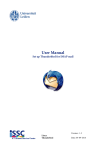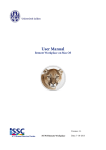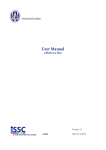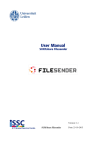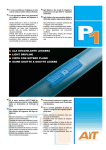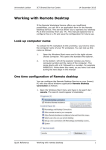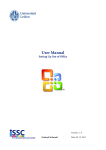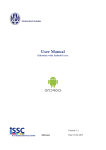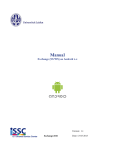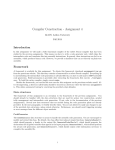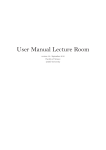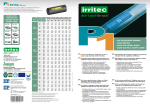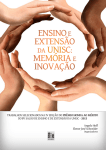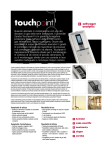Download 1. Pieter de la Court Building - is not a decision at
Transcript
Welcome Dear student, Welcome to the Faculty of Social and Behavioural Sciences of Leiden University! Studying at Leiden University will come with many, exciting changes: you will discover a new city and meet new people. And maybe you even moved to another country! At Leiden University you might have to get used to a new, more independent way of studying. Your faculty’s staff and students are here to help you. In this booklet you will find practical information about the support and facilities that the Faculty of Social and Behavioural Sciences can offer. About the Faculty of Social and Behavioural Sciences Our faculty consists of four institutes: Cultural Anthropology and Development Sociology, Education and Child Studies, Political Science, and Psychology. You will be part of a small, but growing international community within the Faculty, which currently represents more than 55 nationalities. We wish you all the best in your studies and hope you will have a wonderful time in Leiden. Hanna Swaab Dean of the Faculty of Social and Behavioural Sciences More information about Leiden University Be sure to read the brochure “Finding your way around Leiden”, available from: http://media.leidenuniv.nl/legacy/finding-your-way. pdf Would you like to know what’s going on? Follow us on Facebook: • www.facebook.com/fswleiden And read our weblogs • www.leidenpsychologyblog.nl • www.leidenanthropologyblog.nl 1 Table of contents 1. Pieter de la Court Building ..................................... 3 2. Study support .................................................................... 4 Counselling and advice .............................................................. 4 Personal Development: POPCorner and Honours College .. 7 Student Services Centre ............................................................. 8 Master Thesis Lab ....................................................................... 9 Student Career Service ............................................................. 10 3. Would you like to get involved? ........................... 11 Student representatives ............................................... 11 Study associations ........................................................ 12 4. Finding your way around your faculty .................. 13 Library ............................................................................. 13 Service desk .................................................................... 14 Readers ............................................................................ 14 Lockers ............................................................................ 15 Audiovisual services ...................................................... 15 Student ID card .............................................................. 15 Different locations ......................................................... 15 5. ICT ....................................................................... 16 Computer facilities ...................................................... 16 Computer helpdesk ..................................................... 16 Copy and print ............................................................. 17 ULCN account ............................................................. 18 USis ............................................................................... 18 Blackboard ................................................................... 19 Wifi ............................................................................... 20 2 6. Education ................................................................... 20 European Credit Transfer System .................................... 20 Classes ................................................................................. 21 Grading system ................................................................... 22 Examinations ...................................................................... 22 English language proficiency ............................................ 23 1. Pieter de la Court Building The Faculty of Social and Bahavioural Sciences is based in the Pieter de la Court Building. Opening hours Pieter de la Court Building Monday to Thursday: 07.00 - 22.00 Friday:07.00 - 20.00 The faculty building is not open during the weekends. The university will be closed on: 25 December 2015 - 1 January 2016 (Christmas Reces) 25 March 2016 (Good Friday) 27 and 28 March 2016 (Easter weekend) 27 April 2016 (King’s birthday celebration) 5 and 6 May 2016 (Liberation day/Ascension day and the Friday after) 15 and 16 May 2016 (Whitsun) For a clear overview of the coming academic year, check out the academic calendar http://media.leidenuniv.nl/legacy/academische-jaarkalender-2015-2016en.pdf Café opening hours The café is on the ground floor (to the left when you enter the building). Opening hours are: Monday-Thursday: 08:30 -19:30 Friday: 08:30 -15:00 Restaurant (lunch) opening hours: Monday-Friday 11:45 - 13:45 Toilets Toilets are located on each floor by the corner staircases. Additional facilities are located across from the restaurant. 3 2. Study support Counselling and advice Study advisers Your Study Adviser can help you with questions concerning: • The content and planning of your programme • Your academic and study skills • Special arrangements for students with learning disabilities or other personal circumstances • The rules regarding study delay • Binding Study Advice (BSA) • Complaints Cultural Anthropology and Developmental Sociology Nina Osterhaus-Simić Room: 3A17, Phone: + 31(0)71 527 3450 Email: [email protected] Education and Child Studies: Exchange students, Master Child and family Studies, Dutch master: Forensische Gezinspedagogiek Jacquy Bouwer Room: 4B03, Phone: +31 (0)71 527 4072 Email: [email protected] Education and Child Studies: Master Educational Studies Sjanie Koolstra Room: 4B03, Phone: +31 (0)71 527 4033 Email: [email protected] 4 Education and Child Studies: Master Learning problems and impairments, Master Applied Neuroscience, Dutch masters: Orthopedagogiek & Kinderen met leer- en gedragsproblemen in het onderwijs Silvia Richter Room: 4B03, Phone: +31 (0)71 527 4046 Email: [email protected] Political Science: Master’s students Alma Caubo Room: 5B01 Phone: +31 (0)71 527 3944 Email: [email protected] Political Science: Exchange students Daniëlle Lovink Room: 5B03 Phone: +31 (0)71 527 3990 Email: [email protected] Psychology Exchange students Dieuwerke de Groot Room: 2C02 Phone: +31(0)71 527 3609 Email: [email protected] Psychology Master’s students Mirthe Haas Room: 2A55 Phone: +31(0)71 527 4635 Email: [email protected] Appointments: via the Student Services Centre, [email protected] Psychology: International Bachelor Psychology (IBP) Jennifer Martin Room: 2C04 Phone: +31(0)71 527 6355 Email: [email protected] Appointments: via the Student Services Centre, [email protected] 5 International Student Adviser As an international student, you may be unfamiliar with Dutch universities and need to be pointed in the right direction when searching for help. The International Student Adviser can help you to find your way around Leiden and its University or refer you to the best contact person. For more information, please contact: Jantien Delwel Plexus Student Centre, Kaiserstraat 25 Email: [email protected] Phone: +31(0)71 527 3245 Walk-in clinic hours: Monday 09.30 - 12.00 Tuesday 13.00 - 15.30 Thursday 09.30 - 12.00 Friday 09.30 - 12.00 Psychological counselling Are you feeling down? Are you dealing with study stress or personal issues you would like to have some help with? The psychological counsellors can help you with issues like these. Vinanda Kapooria E-mail: [email protected] Phone: +31 (0) 71 527 8026 Visit the walk-in clinic of the Student Counselling Service: Plexus Student Centre, Kaiserstraat 25 Monday-Friday: 11.00 - 12.00 6 Personal Development: POPCorner & Honours College POPCorner The POPCorner can help you with your personal development, finding your way around the university and making the best possible start. The POPcorner offers: • The ‘Smart studying’ walk-in clinic for practical study tips • Workshops on studying effectively, planning and preparing for exams • Support with preventing and overcoming barriers that keep you from studying succesfully • Study tips from other students • Individual support to help you have a good start Contact: Location: Office hours: Phone: E-mail: Website: 3C01 Mon, Tue and Thu from 09.30 to 16.30. Wed: by appointment. +31 (0) 71 527 8846 [email protected] http://socialsciences.leiden.edu/students2/guidance/popcorner/ Honours College Are you a bachelor’s student looking for an additional challenge outside your regular study programme? Ambitious students with a wide field of interest can apply for the Honours College and take on a considerable extra course load. As an Honours College student, you sample a wide range of academic disciplines and meet students from other degree programmes. Website: www. honourscollege.socialsciences.leiden.edu 7 Student Services Centre You can contact the Student Services Centre with regard to practical questions about your studies. The SSC can help you with the following: • • • • • • • Registration for courses and exams Transcript requests Questions about petitions Questions about your course history in uSis Booking an appointment with the Study Adviser during appointment hours Information on diplomas and graduation Other questions - the SSC is the front office for students, so please don’t hesitate to contact us if you’re not sure where to go Contact: Location: Information desk: Phone: Email: Website: 8 Pieter de la Court Building, Ground floor Mon - Thu: 10.00–14.00. Fri: 10.00-12.00. 071-527 7779, Mon - Fri: 10.00-12.00 [email protected] http://socialsciences.leiden.edu/students2/guidance/ssc/ Master Thesis Lab The Master Thesis Lab is a facility that provides additional support for students writing their master’s thesis. It is available to all master’s students of the Faculty of Social and Behavioural Sciences. The lab offers various facilities such as statistical advisers, 22 work spaces, a Thesis Lab Assistant, and books. Before you can use the Master Thesis Lab you have to register. For detailed information, please visit the Master Thesis Lab website: www.socialsciences.leiden.edu/graduateschool/mtl/ Opening hours Monday to Thursday: 07.00-22.00 Friday:07.00-20.00 Thesis Lab Assistant are available for questions and advice: Monday-Friday 09.00-17.00 9 Student Career Service The Student Career Service at the Faculty of Social and Behavioural Sciences can offer advice regarding your study choice, internship preparation and career planning, by offering: • • • • workshops on career orientation and finding a job individual study/career advice information about the Dutch job market help with writing your CV and letters of motivation Contact: Location: Office hours: Walk-in clinic: Phone: E-mail: Website: 10 3C04 Mon and Thu 09:00 - 16:00, Tue 09:00 - 13:00, Wed: 09:00 - 17:00, Fri: 09:00 - 12:00 Wed and Thu: 11.00 - 12.00 +31(0)71-5278025 [email protected] http://students.leiden.edu/career/ Student Career Service: Francien Bouhuijs, Lieneke Gijsbers and Simone Keijsers 3. Would you like to get involved? Student representatives Representing you: The Assessor is the student member of the Faculty Board Do you have suggestions regarding your programme or the facilities in the Faculty? Contact the Assessor, who represents student’s interests on the Faculty Board. Pepijn Knops can be reached at: [email protected] Become an active student! As an active student you can get involved in the quality of your education. You will gain practical work experience, which can help you in your future career. Would you like to represent other students when your programme is being evaluated, or when decisions about the course content and faculty regulations are being made? Would you like to organise study-related activities for your fellow students? If so, there are several committees, boards and associations that you could join. For more information, please contact Pepijn Knops: [email protected] 11 Study associations Each institute has a ‘club’ for students to join. Study associations are intended for all students from a particular discipline and are responsible for organising activities, such as lectures, seminars, and excursions. These activities are mostly course-related and are a nice way to meet fellow students. On top of that, members often receive reductions on study materials. The study associations sell books for bachelor’s and master’s students, usually at the beginning of each term. All study associations are situated in the basement of the Faculty building. Cultural Anthropology & Developmental Sociology Itiwana Location: SB07 Phone: +31 (0)71 527 4025 E-mail: [email protected] Education and Child Studies Emile Location: SB05 Phone: +31 (0)71 527 3685 E-mail: [email protected] Political Science SPIL Location: SB09 Phone: +31 (0)71 527 3872 E-mail: [email protected] Psychology Labyrint Location: SA55 Phone: +31 (0)71 527 3618 E-mail: [email protected] 12 4. Finding your way around your faculty Library The Faculty Library is located on the ground floor of the Pieter de la Court building. There are 144 study places, of which 26 have computers: 16 in the PC area next to the main desk and 10 in separate workplaces to the right of the entrance. In order to get a library subscription and to borrow books, you will need a student ID card (LU Card). See page 15 of this booklet. The collection of the Social and Behavioural Science Library consists of the following sections (with location code): Cultural Anthropology (CULTAN) Methods & Statistics (FSW M&T) Educational Science (PEDAG) Political Science and Public Administration (POLWET) Psychology (PSYCHO) Sociology (SOCIOL) Women’s Studies (VENA ) Opening hours: E-mail: Phone: Website: Monday to Thursday: 09.00 - 20.00, Friday: 09.00 - 17.00 [email protected] +31 (0)71 527 3975 www.library.leiden.edu/social-behavioural-sciences 13 Service desk At the service desk you can: • Book lecture rooms (if necessary with audio-visual and ICT equipment), for instance when you need to discuss an assigment with your fellow students Purchase office supplies Borrow cameras and voice recorders Report problems with printers Report problems with your Student ID Card • • • • Location: Opening hours: E-mail: Phone: Desk on 1st floor Monday - Friday: 09.00 - 17.00 [email protected] +31 (0)71 527 8989 Readers In many courses readers are used, consisting of copies of relevant journal articles or book chapters. Readers can be bought from the Leiden University ordersite: www.readersonline.leidenuniv.nl. For English, press on the top right corner of the website. 14 Lockers Lockers are located near SC01 (the lecture room in the basement), and on the first floor, near room 1A20. Audiovisual Services At the Audiovisual Service you can borrow cameras, audio equipment, beamers, and all other kinds of audiovisual equipment. E-mail: [email protected] Location: 1B11 Opening hours: Monday to Friday 09.00 – 17.00 Student ID Card / LU-Card All students enrolled at Leiden University are required to have a Leiden University student ID card (called ‘LU-Card’), which will give access to all university facilities, including all university libraries and printers. Please note that students must present their Leiden University student ID card at all examinations. How do I get a LU-Card? • Vist Plexus Student Centre on Kaiserstraat 25. • Visit: www.services-facilities.leiden.edu/lu-card to get the card online. Different locations Leiden University’s buildings are spread throughout the city of Leiden. Some of your classes might take place outside your faculty building. Check out this website if you need help finding your way to one of them: www.visitors.leiden.edu/info/nocampus.html 15 5. ICT Computer facilities Student PCs are available in the basement, on floors 1 through 4 across from the stairs, and in the following rooms 1A26, 1A28, 1A30, 1A32, 1A46, 2B04. Some of the computer rooms may be temporarily unavailable when in use for courses. The computer room in the basement is always accessible to students. Laptop connections and a wireless network are available at several locations in the basement and in the library. In addition, students can use computer facilities at other faculties and at the University Library, Witte Singel 27, or at the Plexus student centre, Kaiserstraat 25. The applications on student computers, such as uMail, can all be trusted. All the computers, available to students free of charge, have CD-ROM/USB-key facilities, bibliographic systems as well as the following programs: Microsoft Office, Microsoft Internet Explorer, SPSS and many more. For each student 100 MB personal disk space is available. Several photocopier/printers are available for printing, please see ‘Copy and print’. Several scanners, plus photo/movie editing software are available in Studio I in 1B02; movie editing software is also available in Studio II in 1B13. Computer helpdesk (ISSC) The ISSC computer helpdesk provides help with ULCN-accounts and problems with hardware and/or software in the computer rooms. Location: Opening hours: 16 First floor (next to the Servicedesk) Monday to Friday: 09.00 – 17.00 Copy and print Printer locations Photocopier/printers available to students are located all around the Pieter de la Court building: • 1st floor, nearby the Service Desk • 1st floor, nearby 1A32 • Nearby SA17 • Library • 6th floor, nearby 6.C51 (Master Thesis Lab) How to print 1. Get yourself a LU-Card (see: page 15) 2. Top up your balance via the PinPoint in the central hall or online via http:\\webprint.leidenuniv.nl. 3. Select the printer ‘LU Card Printer’ and print your document. 4. Go to any printer in the building and scan your LU-Card. Now you can print your document. Advanced printing For more advanced printing, for instance binding your thesis, you can visit the Copy & Print Shop on the first floor, to the left of the Service Desk. Email address: Opening hours: [email protected] Monday to Friday 08.30 – 17.00 17 ULCN account All students enrolled at Leiden University are given a ULCN-account (ULCN = Universiteit Leiden Community Network). With this account students have access to PCs, uMail, Blackboard, the digital library and catalogue (uLip), and can register for courses and exams via uSis. Your Leiden University e-mail address (uMail) will be used by lecturers and others to contact you. For that reason, it is very important to check your uMail messages regularly! It is possible - and recommended - to forward your uMail to your regular private e-mail address. For more information about ULCN, uMail, uSis, and mail-forwarding, please visit www.services-facilities.leiden.edu/ulcn. USis Via uSis students can: • enroll and unenroll for courses; • enroll and unenroll for tutorials/seminars; • enroll and unenroll for examinations; • retrieve examination results; • change their contact information. When you retrieve your examination results, both your grade and credit points are shown, and any results you have obtained elsewhere if they have been passed on to your institute. You can find uSis on the homepage of the Faculty of Social and Behavioural Sciences, on the right of the page: http://socialsciences.leiden.edu/. Click the uSis button and login with you ULCN account and personal password. If you have any questions about the use of uSis, you can find FAQ’s and video tutorials on http://media.leidenuniv.nl/legacy/usis-faq-en.pdf. If you still have questions you can contact the uSis Helpdesk website: www.usishelp-en.leidenuniv.nl/data/toc.html. 18 Blackboard Most courses at the faculty are supported by Blackboard, an interactive electronic learning environment. Through Blackboard you can access news messages, retrieve study material, and hand in assignments, over the internet. You will need to visit Blackboard on a regular basis to be sure to have the latest information. Lecturers will assume that all students read the information provided on Blackboard. Log in The home page for Blackboard is: http://blackboard.leidenuniv.nl. On this page you will find course information (partly in Dutch), but most important to you is the login button. Please log in with your ULCN-account and personal password. On the right you will see the column My Courses. These are the courses to which you have access. For most courses you can enrol yourself online. However, some courses demand prerequisites which you may not have. Some courses may not be visible because they are not open for enrolment yet. In that case you are advised to try again later. You can also download the Blackboard app on your phone. Enrolment Go to Courses → Course Catalog → Faculteit der Sociale Wetenschappen → the institute in which you are taking your courses. Table 1 contains translations of the institute names. Table 1 Culturele Antropologie en Ontwikkelingssociologie Pedagogische wetenschappen Politieke wetenschap Psychologie Cultural Anthropology and Development Sociology Education and Child Studies Political Science Psychology Click on and enrol in the desired course. The next time you log in, the course will appear in the list Courses in which you are enrolled (see: My Institution → My Courses). On the home page you can find a link to a user manual in English (handleiding in Dutch). If you still have questions concerning Blackboard, please contact the ICT & Education Lab. E-mail: [email protected] Location: 1B11 Please note: Enrolling for courses in Blackboard does NOT constitute official registration! You always have to register for a course via uSis. 19 Wifi Would you like to access internet on your mobile phone or laptop? Leiden University offers two networks to choose from: • • Leiden University Wireless Network (LUWA). Access via your Leiden University account (called ‘ULCN-account’). Eduroam. Eduroam offers more security than LUWA. Once you have installed Eduroam, your devices will be able to automatically connect whenever you are in a Leiden University building. Before you can use Eduroam on your laptop, you will need to install software. On your phone, you will need to download a so called ‘Config File’. For more information, check out: http://issc.leiden.edu/ict-students/wireless-access/wireless-access-manuals.html To enable access to the wireless network laptops must be equipped with an up-todate virus scanner. 6. Education European credit transfer system ECTS, the European Credit Transfer System, was developed by the European Commission in order to guarantee academic recognition of studies abroad. European credits are a value allocated to course units to describe the workload required to complete a course. They reflect the quantity of work each course requires in relation to the total quantity of work required to complete a full year of academic study: lectures, practical work, seminars, individual study time and examinations or other assessment activities. The workload of one year of study is 60 credits; 1 credit reflects 28 hours of study. Credits are awarded only when the course and all required examinations have been completed successfully. 20 Classes There are two important ways in which course material is presented: via lectures, and via seminars or tutorials. Particularly in tutorials and seminars, active participation is expected from all students. In addition to the ‘contact hours’, you are expected to spend time on ‘self-study’ (reading books and articles; writing papers and preparing oral presentations). Course Level Indication Courses at Leiden University have been categorised in such a way that each category indicates the level of the course. For each subsequent year of a particular programme, course levels are increased to ensure students achieve the progress they need in order to reach the academic standards required for graduation. Descriptions of course levels Level 100 First year bachelor’s course; general introduction Level 200 First or second year bachelor’s course with an introductory character Level 300 Second or third year bachelor’s course; intended for advanced students Level 400 Third year bachelor’s or first year master’s course; specialised course Level 500 Theoretically oriented course Level 600 Very advanced academic/theoretical course 21 Grading system Within the Dutch grading system, courses are graded on a scale from 1 to 10. The formal designation of the grades is as follows: 10: Excellent (flawless; 100%) 9: Very good 8: Good 7: Satisfactory 6: Pass 5 (or lower): Fail The lowest pass grade is 6, while grades 9 and 10 are rarely given. It is good to know that in the Dutch system teachers never give grades on the basis of a normative curve and competition plays little or no role. Examinations Registration Students themselves are responsible for registering for exams. You can register via uSis from 100 up to ten days before the exam date. After this deadline, registration is no longer possible. ID during exams All students must present their Leiden University student ID card at any examination. Examination papers that do not contain the student’s ID card number are invalid and will not be graded. Duration The duration of a written examination is normally two or three hours. An oral exam will in general take a minimum of thirty minutes. Results Examination results are published via uSis. Examination dates For a clear overview of this academic year, check out the academic calendar: http://media.leidenuniv.nl/legacy/academische-jaarkalender-2015-2016en.pdf It is not possible to deviate from the set schedule for examinations and/or resits. Students should take the examination dates into account when planning their journey back home. Note that examinations can be held even on the last day before a holiday. With a few exceptions, it is also possible to have the exam sent to your home university. Please contact your International Student Adviser for details. Course and Examination Regulations The Boards of Examiners are responsible for the effective organisation of the tests and examinations, and Course and Examination Regulations (OER). Note that, for example, taking information from the internet without mentioning the source may be considered plagiarism. Handing in identical or similar papers for different courses is not allowed either. In some cases this may result in being excluded from all courses for a full year. You can contact the Board if you have any complaints about examiners or regarding how the Course and Examination Regulations apply to your programme. In addition, you can make requests for exceptions to the OER. For example, if you have a documented learning disability such as dyslexia, you can request more time to complete an examination. Furthermore, you can make a request for an exception to your set educational programme. English language proficiency While proficiency in English is required for admission to the bachelor’s, master’s and PhD programmes in English, there is also the opportunity to take extra (intensive) language courses in English at the Academic Language Centre at Leiden University to further improve your language skills. Please see the website: www.hum.leiden.edu/languagecentre/. 23 Notes ___________________________________________ ___________________________________________ ___________________________________________ ___________________________________________ ___________________________________________ ___________________________________________ ___________________________________________ ___________________________________________ ___________________________________________ ___________________________________________ ___________________________________________ ___________________________________________ ___________________________________________ ___________________________________________ ___________________________________________ ___________________________________________ ___________________________________________ ___________________________________________ ___________________________________________ ___________________________________________ ___________________________________________ ___________________________________________ ___________________________________________ 24
























